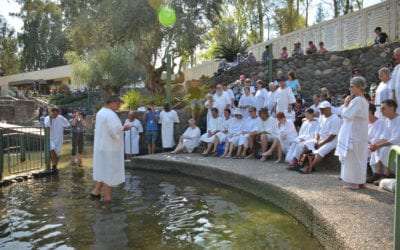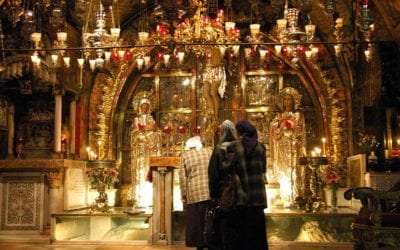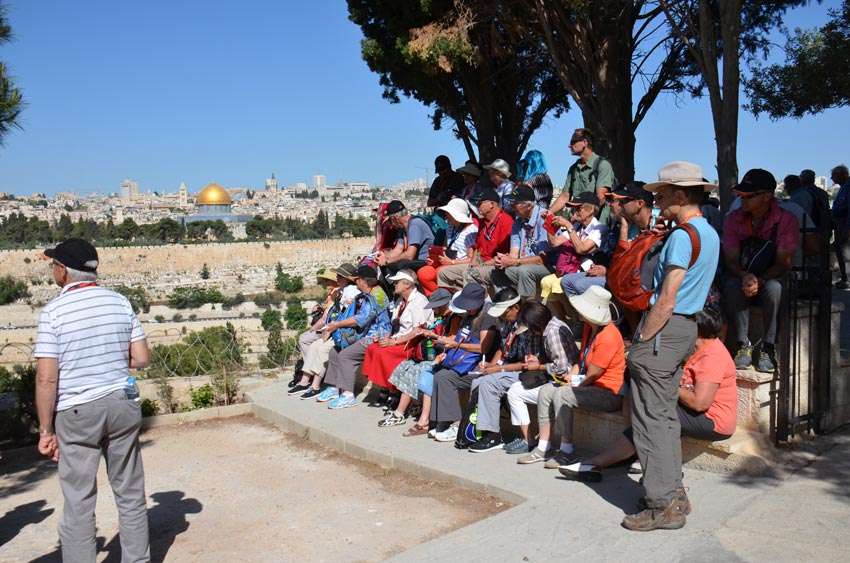First, when you contrast modern tourism with traditional pilgrimage, a Christian visitor, coming on a tourist visa, can still be a fully bona fide pilgrim. Just because there is a strong tourist element, similar to many secular tours, does not mean the journey lacks faith or inspiration.
Kameel Majdali

Get In Touch
Jerusalem: A Magnet for Christian Visits (Part Six)
First, it is this author’s conviction, after 6 years of study and a 95,000 thesis, that a Christian who visits a holy city like Jerusalem is a ‘pilgrim,’ whether they consciously and proactively seek to be, or not.
Jerusalem: A Magnet for Christian Visits (Part Five)
Looking for a definition is not helped by the social anthropologists, the only group that ever studies the pilgrim phenomena. They use terms like communitas, a liminal experience, freedom from social structure, etc. Yet, they fail to utilise the very source-book of Christian pilgrimage, namely the Bible.
Jerusalem: A Magnet for Christian Visits (Part Four)
Pilgrim or Tourist? Helping Define the Modern Christian Visitor to Jerusalem? In Part 01 of our series, we learned that there has been a continuous flow of Christian pilgrims from the very early days of the Church. Today, Christians visit the Jewish state more than any other group, usually above the 50% mark. In Part 02, we learned about the ‘tourist factor’ that has helped to stimulate Christian visits. Promotion of Christian Biblical Tourism has been a constant since the Six Day 1967 War. In Part 03, we have seen that this ‘continuous flow’ and ‘tourist promotion’ has resulted in increased visits by Christians to Jerusalem and Israel. They come from all over the world, including countries that do not have diplomatic ties to Israel (including Indonesia and Malaysia and parts of the Arab world). Concurrently, visits to Jordan dropped dramatically after the Six Day War. Jordan once controlled eastern Jerusalem but once that ended, tourist numbers dropped, too. In Part 04, we will examine the important question: are modern Christian visitors ‘pilgrims’ or ‘tourists’ or both? We need to construct a contemporary definition, though this will not be easy since modern Christian visits are truly fluid and versatile grass […]
Jerusalem: A Magnet for Christian Visits (Part Three)
For many believing Christians, it is a dream come true. Whether on tour, business, or a private visit, a highlight for many is a visit to Jerusalem, the holy city. Since the Six Day War of 1967, when the historic Old City and Mount of Olives came under Israeli control, the number of Christian visitors has risen. In addition, the demographics have changed from a predominantly Middle Eastern to a western and third world constituency. The purpose of this series is to understand what is happening, why, and how it impacts the future. In Part 01, we learned that the ‘river of pilgrimage’ has been flowing from the very beginning of Christianity. In Part 02, the ‘tourism factor’ was introduced. The Ministry of Tourism took a proactive approach in marketing Israel and Jerusalem as ‘attractive,’ ‘inspiring,’ and ‘safe’ places to visits. Their efforts appear to have paid off: the number of Christian visitors has risen steadily over the past half a century, though marketing alone is not the only reason for the increase. In this article, Part 03, we will learn more about the rise in numbers and demographics of the Christian visitors since Israel reunited Jerusalem. The paradox is […]
Jerusalem: Magnet for Christian Visits (Part Two)
In Part 01 of our series about Jerusalem and Christians visits, we learned that the ‘river of pilgrimage’ has been flowing from the very beginning of the church age. Christians constitute the highest amount of sacred visitors to a holy city which is also sacred to Judaism and Islam, too. This growing phenomena in Christian visits is even more remarkable considering that neither Christ nor the apostles command it, and there is more of a spiritual, rather than geographic, emphasis in Christian worship. We also learned why Christians visit Jerusalem. They can be summarised in two key words: Devotion: From the very beginning, Christians have been motivated to visit Jerusalem so that they can ‘walk where Jesus walked.’ Following in the footsteps of the Master is a strong sign of devotion. Education: Pious believers visit Jerusalem because they want to learn more about the Bible. Considering that Jerusalem is mentioned over 811 times in the KJV, it is indisputably the premier city of Scripture. What is remarkable is that these twin pillars of devotion and education can be applied across the board, to pilgrims from every denomination and every century of the church age. The Tourism Factor To the ancient […]






